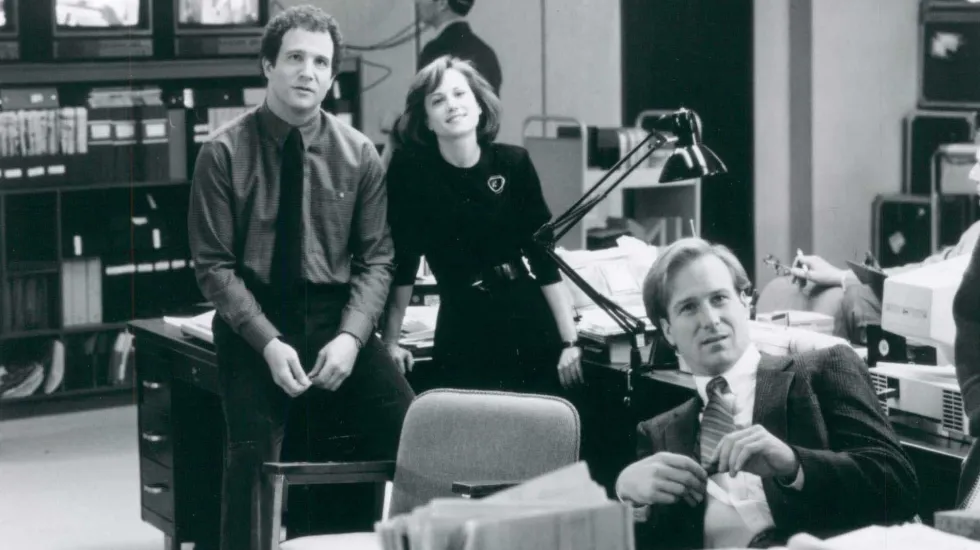
NEW YORK — William Hurt, whose laconic charisma and self-assured subtlety as an actor made him one of the 1980s foremost leading men in movies such as “Broadcast News,” “Body Heat” and “The Big Chill,” died Sunday. He was 71.
“He died peacefully, among family, of natural causes,” his son Will said in a statement. The Hollywood Reporter said he died at his home in Portland, Oregon.
In a long-running career, Hurt was four times nominated for an Academy Award, winning for 1985’s “Kiss of the Spider Woman.” After his screen debut in 1980’s Paddy Chayefsky-scripted “Altered States” as a psychopathologist studying schizophrenia and experimenting with sensory deprivation, Hurt quickly emerged as one of the 1980s’ foremost leading men.
In Lawrence Kasdan’s 1981 steamy neo noir “Body Heat,” Hurt starred alongside Kathleen Turner. In 1983’s “The Big Chill,” again with Kasdan, Hurt played the Vietnam War veteran Nick Carlton, one of a group of college pals who gather for their friend’s funeral.
Having started in New York theater, Hurt then returned to the stage to star on Broadway in David Rabe’s “Hurlyburly,” for which he was nominated for a Tony. Shortly after came “Kiss of the Spider Woman,” for which won Hurt the best actor Oscar for his performance as a gay prisoner in a repressive South American dictatorship.
In 1986’s “Children of a Lesser God,” Hurt again was nominated but it was his co-star, former Chicagoan Marlee Matlin, who took the Oscar for her performance as a deaf custodian at a school for the deaf. Hurt played a speech teacher and dated Matlin offscreen.
In her 2009 memoir, Matlin detailed physical abuse and drug abuse during their relationship. Hurt at the time issued an apology saying: “My own recollection is that we both apologized and both did a great deal to heal our lives.”
That wasn’t Hurt’s only experience with his private life finding notoriety.

Hurt was first married to Mary Beth Hurt from 1971 to 1982. While he was married, he began a relationship with Sandra Jennings, whose pregnancy with their son precipitated Hurt’s divorce from Mary Beth Hurt.
A high-profile court case ensued six years later in which Jennings claimed she had been Hurt’s common-law wife under South Carolina law and thus entitled to a share of his earnings. A New York court ruled in Hurt’s favor, but the actor continued to have a strained relationship with fame.
“Acting is a very intimate and private thing,” Hurt told The New York Times in 1983. “The art of acting requires as much solitude as the art of writing. Yeah, you bump up against other people, but you have to learn a craft, technique. It’s work. There’s this odd thing that my acting is assumed to be this clamor for attention to my person, as if I needed so much love or so much attention that I would give up my right to be a private person.”
In those years, Hurt also struggled with drug and alcohol abuse, and attended rehabilitation clinics. He also developed a reputation for not always being an easy collaborator. The New Yorker called him “notoriously temperamental.”
In 1989, Hurt married Heidi Henderson, who he met at rehab. They had two children together. Hurt also had a daughter with French actress and filmmaker Sandrine Bonnaire, whom he met while making the straight-to-video 1992 Albert Camus adaptation “The Plague.”
Among Hurt’s greatest work was his Oscar-nominated performance in James L. Brooks’ 1987 comedy “Broadcast News,” as a slick but lightweight anchorman who symbolized the emerging fusion of entertainment and journalism.
“Broadcast News” co-star Albert Brooks was among the many who responded to Hurt’s passing Sunday. “So sad to hear this news,” wrote Brooks on Twitter. “Working with him on ‘Broadcast News’ was amazing. He will be greatly missed.”

After his torrid ’80s run, Hurt fell increasingly out of favor with filmmakers in the ‘90s, and some reasoned that it was because of his reputation. Hurt, however, continued to defend his approach, telling The Los Angeles Times in 1994 that “I give more by solving the truth than by pandering to expectations and facile hopes.”
“If a director tells me to make the audience think or feel a certain thing, I am instantaneously in revolt,” Hurt said. “I’m not there to make anyone else think or feel anything specific. I have agreed to something the whole piece says. Beyond that it is my only obligation to solve the truth of the piece. I don’t owe anybody anything — including the director.”
He did land one more Oscar nomination in 2006, for his work as a crime boss in David Cronenberg’s “A History of Violence.”
Fans of the Marvel Cinematic Universe knew Hurt as Gen. Thaddeus Ross, the military researcher who turned Bruce Banner into a green muscleman in “The Incredible Hulk” (2008). Hurt reprised the role in “Captain America: Civil War,” “Avengers: Infinity War,” “Avengers: Endgame” and “Black Widow.”
Other credits included “Gorky Park,” “The Accidental Tourist,” “Syriana” and “Into the Wild.”







